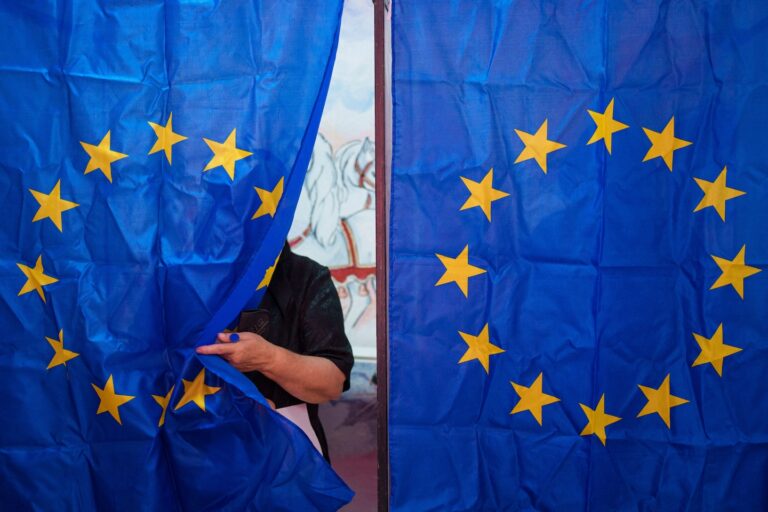Early results from the European Union parliamentary elections may hint at its eventual arrival. Across the continent, and especially in some of the larger countries, far-right parties performed well or even produced record results. Their success is not a guarantee of government: the European centre-right coalition remains the largest force in parliament and can work with the mainstream centre-left. But their rise highlights a deeper trend: the European Union, long celebrated as a supranational bastion of liberal values, is not only more receptive to illiberal nationalism, but could also be a testing ground for a new era of right-wing politics in the West.
The results were bleak for centrist supporters like French President Emmanuel Macron and German Chancellor Olaf Scholz. Exit polls showed Scholz’s Social Democrats expected to finish third behind their main centre-right rivals and the far-right Alternative for Germany (AfD). Macron’s crushing defeat at the hands of far-right leader Marine Le Pen’s party prompted him to dissolve the French National Assembly and schedule early elections. Their plight is echoed across the Atlantic, where President Biden is facing a tough battle against a pro-Trump movement that sees itself as explicitly allied with Europe’s far-right anti-immigrant and anti-woke parties.
Get caught up in
Summarised stories to keep you up to date
“Nearly a decade ago, the upheaval over Britain’s departure from the European Union in the spring of 2016 was an early sign of a global shift toward conservative nationalism,” Politico’s Nicholas Vinokur wrote. “In retrospect, it’s clear that this movement was part of the engine that propelled Donald Trump to a surprise victory over Democrat Hillary Rodham Clinton in that year’s US presidential election.”
To be sure, the European Parliament is not the most important institution on the continent. Although Parliament is not as powerful as other EU institutions, it helps set the EU agenda: “Parliament cannot directly initiate legislation, but it can veto and shape legislation. “Parliament is responsible for approving the EU budget and has agenda-setting powers,” their colleagues explained. “MEPs played a key role in negotiating the EU’s groundbreaking artificial intelligence regulation last year. Parliament also has the final say on the selection of the European Commission President, arguably the most powerful office in the EU.”
Germany’s center-right politician Ursula von der Leyen, who has served as chancellor for the past five years, is expected to seek a second term and may this time count on the support of Europe’s far-right leaders, especially Italian Prime Minister Giorgia Meloni, who has risen from the obscure fringe into the European mainstream more effectively than any Western nationalist leader.
Analysts see Meloni’s rise as a template for how the far right can take power: Italy’s hollowed-out center-right has not been an obstacle for a party with roots in post-World War II neo-fascism. But they also see her success as a sign of the limits of the far right’s ability to mobilize masses. Meloni has distanced herself from (and sometimes at odds with) supposed allies like Le Pen, who has shunned her hard-line colleagues in Germany’s AfD party.
Still, European politics seems to be moving in directions where these parties largely agree: skepticism about the EU’s aggressive climate change policies, and more strongly on immigration. “The various far-right parties across Europe share common positions on identity, immigration, and Islam, and there is an increasing convergence with the center-right in that regard as well,” Hans Kundnani, a visiting scholar at New York University’s Remarque Institute, told me.
“The new centre of power will not be the far right, but the far right of von der Leyen’s centre-right coalition,” said Dutch political scientist Cas Mudde, who said the coalition would use pressure from Meloni and others to “pull its traditional coalition partners further to the right, especially on issues such as the environment, gender and sexuality and, of course, immigration.”
Despite Schengen’s open internal borders, the European Union is working hard to strengthen external barriers to asylum-seeking migrants. After a year-long investigation with the Media Union, my colleague recently detailed how the European Union and individual European governments are aiding and funding North African countries that are detaining tens of thousands of migrants, some of whom are stranded in remote areas of the Sahara Desert.
“EU refugee policy is more Trumpian than people realise,” Kundnani said, adding that a more overtly right-wing EU “wouldn’t be that different from the EU we have today”.
Kundnani, who is also the author of “Eurowhiteness: Culture, Empire and Race in the European Project,” argued that we are now exposing the “myth of cosmopolitanism” that has long surrounded the debate about the European Union and its idealistic liberal technocrats. While some evangelists of the European project saw the initiative as a first step towards a borderless world, the political reality on the continent tells a rather different story.
“Just as the nation-state is a political form of nationalism, the EU is a political form of regionalism,” Kundnani said. “When you say you’re European, you’re not saying you’re a world citizen.”
Leading policymakers are wrestling with the pessimism inherent in the far-right’s talk about what it means to be European. “There is a disproportionate sense of disillusionment in our society,” German Foreign Ministry Secretary of State Thomas Bagger told The New York Times. “We have lost faith in our understanding of the long course of history and its tendency towards democracy. Russia has lost its vision for the future. [President Vladimir] Putin looked to the past. We risk falling into the same trap.”

